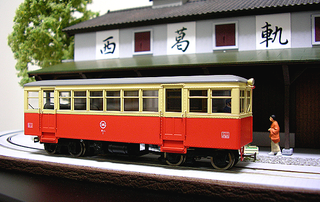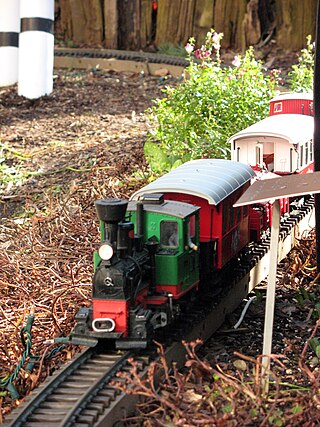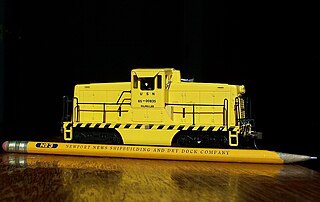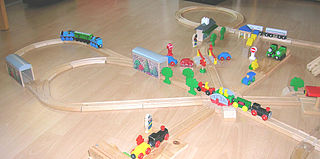
Railway modelling or model railroading is a hobby in which rail transport systems are modelled at a reduced scale.

LGB stands for Lehmann Gross Bahn - the "Lehmann Big Train" in German. Made by Ernst Paul Lehmann Patentwerk in Nuremberg, Germany, since 1968 and by Märklin since 2007, it is the most popular garden railway model in Europe, although there are also many models of U.S. and Canadian prototypes. LGB caused a revival of garden model railroading in the United States when it was introduced. LGB is sold in North America through Wm. K. Walthers, who took over from Ernst Paul Lehmann's subsidiary, LGB of America, when Märklin bought the LGB assets. Most of the European prototypes were manufactured in Germany, while much of the North American rolling stock was made in China. Production was later moved to Hungary.
Digital Command Control (DCC) is a standard for a system for the digital operation of model railways that permits locomotives on the same electrical section of track to be independently controlled.

O scale is a scale commonly used for toy trains and rail transport modelling. Introduced by German toy manufacturer Märklin around 1900, by the 1930s three-rail alternating current O gauge was the most common model railroad scale in the United States and remained so until the early 1960s. In Europe, its popularity declined before World War II due to the introduction of smaller scales.

HO or H0 is a rail transport modelling scale using a 1:87 scale. It is the most popular scale of model railway in the world. The rails are spaced 16.5 millimetres (0.650 in) apart for modelling 1,435 mm standard gauge tracks and trains in HO.

N scale is a popular model railway scale. Depending upon the manufacturer, the scale ranges from 1:148 to 1:160. Effectively the scale is 1:159, 9 mm to 1,435 mm, which is the width of standard gauge railway. However the scale may vary to simulate wide or narrow gauge rail. In all cases, the gauge is 9 mm or 0.354 in. The term N gauge refers to the track dimensions, but in the United Kingdom in particular British N gauge refers to a 1:148 scale with 1:160 track gauge modelling. The terms N scale and N gauge are often inaccurately used interchangeably, as scale is defined as ratio or proportion of the model, and gauge only as a distance between rails. The scale 1:148 defines the rail-to-rail gauge equal to 9 mm exactly, so when calculating the rail or track use 1:160 and for engines and car wheel base use 1:148.

Gebr. Märklin & Cie. GmbH or Märklin is a German toy company. The company was founded in 1859 and is based at Göppingen in Baden-Württemberg. Although it originally specialised in doll house accessories, today it is best known for model railways and technical toys. In some parts of Germany and in Sweden, the company's name is almost synonymous with model railways.

1 gauge, gauge 1 or gauge one is a model railway and toy train standard that was popular in the early 20th century, particularly with European manufacturers. Its track measures 1.75 in, making it larger than 0 gauge but slightly smaller than wide gauge, which came to be the dominant U.S. standard during the 1920s.
Z scale is one of the smallest commercially available model railway scales (1:220), with a track gauge of 6.5 mm / 0.256 in. Introduced by Märklin in 1972, Z scale trains operate on 0–10 volts DC and offer the same operating characteristics as all other two-rail, direct-current, analog model railways. Locomotives can be fitted with digital decoders for independent control. Model trains, track, structures, and human/animal figures are readily available in European, North American, and Japanese styles from a variety of manufacturers.

Bachmann Industries is a Bermuda-registered, Chinese-owned company, globally headquartered in Hong Kong; specialising in model railroading.
Roco, based in Salzburg, Austria, is a manufacturer of model railway equipment.
Lima S.p.A. is an Italian brand and former manufacturing company of model railways. The company was headquartered in Vicenza for almost 50 years, from the early 1950s until the company ceased trading in 2004. Lima was a popular, affordable brand of 00 gauge and N gauge model railway material in the UK, more detailed H0 and N gauge models in France, Germany, Italy, Switzerland, and the United States as well as South Africa, Scandinavia and Australia. Lima also produced a small range of 0 gauge models. Lima partnered with various distributors and manufacturers, selling under brands such as A.H.M., Model Power, and Minitrain. Market pressures from superior Far Eastern produce in the mid-1990s led to Lima merging with Rivarossi, Arnold, and Jouef. Ultimately, these consolidations failed and operations ceased in 2004.

Herpa Miniaturmodelle GMBH, is a German manufacturing company that produces die-cast scale model aircraft and plastic model cars and trucks under the "Herpa Cars & Trucks" trademark. The mainstay of the Herpa Wings range is in the 1/500 scale, although models have also been produced in the 1/400, 1/200, and 1/1000 scales as well.

Trix is a German company that originally made Trix metal construction sets. One of its co-founders was Stephan Bing, the son of the pioneer toy-maker industrialist Ignaz Bing. In 1935 the company began producing the electrically powered model trains that it became famous for, under the Trix Express label. Before World War II the company produced a small range of AC powered three rail loco models running on bakelite rails.
Mehano is a Slovenian toy company from Izola, founded in 1952 as Mehanotehnika. It produces a large range of both traditional and electronic toys, as well as model railroad equipment. The company has borne its current name of Mehano since 1990. Mehano applied to restructure in November 2008, following reported economic difficulties during the preceding ten years; production in Slovenia ended. In 2010, Mehano was relaunched with production in China and new branding.

Wooden toy trains are toy trains that run on a wooden track system with grooves to guide the wheels of the rolling stock. While the trains, tracks and scenery accessories are made mainly of wood, the engines and cars connect to each other using metal hooks or small magnets, and some use plastic wheels mounted on metal axles. Some trains are made to resemble anthropomorphical, fictional, and prototypical railroad equipment.

Trix Express was the main model train product range of the Trix of Nuremberg, Germany, currently owned by the Märklin company of Göppingen Germany.

Egger-Bahn was a German model railway manufacturer. The company produced the first H0e models, and established HOe as a viable model railway standard. The firm was founded in 1963 by three brothers. One of them, a performer, soon left the firm. Theodor Egger, technician, and Jonathan Egger, salesman, continued. The models first appeared at the 1963 Nuremberg Toy Fair.
Noch GmbH & Co. KG, from Wangen im Allgäu is a manufacturer and importer of accessories for model trains, especially for building landscapes. It makes products for all common sizes of model trains.
The Simba Dickie Group is a German toy manufacturer founded in 1982 as Simba Toys. The Group is the fourth largest toy manufacturer in Germany. The company's slogan is "We love to make toys".
















